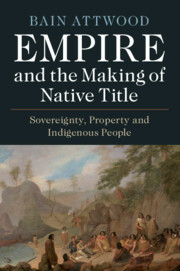Book contents
- Empire and the Making of Native Title
- Empire and the Making of Native Title
- Copyright page
- Dedication
- Contents
- Acknowledgements
- Abbreviations
- Principal Players
- Maps
- Introduction
- 1 Claiming Possession in New Holland and New Zealand, 1770s–1820s
- 2 Batman’s Treaty and the Rise and Fall of Native Title, 1835–1836
- 3 The South Australian Colonisation Commission, the Colonial Office and Aboriginal Rights in Land, 1834–1837
- 4 Protection Claims and Sovereignty in the Islands of New Zealand, 1800–1839
- 5 Making Agreements and a Struggle for Authority, 1839–1840
- 6 The Land Claims Commission and the Return of the Treaty, 1840–1843
- 7 A Colony in Crisis and a Select Committee, 1843–1844
- 8 The Retreat of the Government and the Rise of the Treaty, 1844–1845
- 9 The Making of Native Title, 1845–1850
- Conclusion
- Appendix: The English Text of the Treaty of Waitangi
- Bibliography
- Index
8 - The Retreat of the Government and the Rise of the Treaty, 1844–1845
Published online by Cambridge University Press: 03 July 2020
- Empire and the Making of Native Title
- Empire and the Making of Native Title
- Copyright page
- Dedication
- Contents
- Acknowledgements
- Abbreviations
- Principal Players
- Maps
- Introduction
- 1 Claiming Possession in New Holland and New Zealand, 1770s–1820s
- 2 Batman’s Treaty and the Rise and Fall of Native Title, 1835–1836
- 3 The South Australian Colonisation Commission, the Colonial Office and Aboriginal Rights in Land, 1834–1837
- 4 Protection Claims and Sovereignty in the Islands of New Zealand, 1800–1839
- 5 Making Agreements and a Struggle for Authority, 1839–1840
- 6 The Land Claims Commission and the Return of the Treaty, 1840–1843
- 7 A Colony in Crisis and a Select Committee, 1843–1844
- 8 The Retreat of the Government and the Rise of the Treaty, 1844–1845
- 9 The Making of Native Title, 1845–1850
- Conclusion
- Appendix: The English Text of the Treaty of Waitangi
- Bibliography
- Index
Summary
The winter and spring of 1844–45 saw debate about native title in New Zealand reach a zenith in Britain. In a fierce parliamentary clash, the Treaty of Waitangi became the reference point in discussions of native title. This was not a consequence of the meanings or the importance attributed to the Treaty at the time it was made in 1840 but a result of the claims that had been made about it since 1842–43. In fact, the Treaty’s rise to prominence was the result of a struggle over the meaning of native title. The continuing attack by the New Zealand Company and allies, such as Lord Howick, saw the government increasingly arguing that the Treaty had to be upheld because it had acquired the nature of a solemn contract, and the honour and good faith of the British Crown and the nation were at stake. At the same time, the way that principal political players in Britain represented the natives’ military power varied enormously according to political circumstances and need, which draws into question the conventional wisdom that the British government respected the New Zealanders and their rights because of the simple fact of their might.
- Type
- Chapter
- Information
- Empire and the Making of Native TitleSovereignty, Property and Indigenous People, pp. 301 - 339Publisher: Cambridge University PressPrint publication year: 2020

